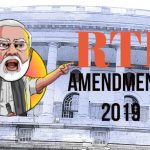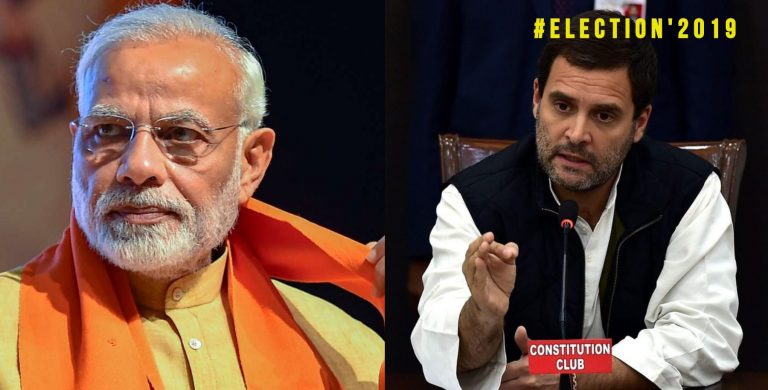With ‘Mission Shakti’ we proved our capability to destroy enemy satellites in the space. Now, we need the same political will to deal with Maoists, for creating a fear-free atmosphere.
April 11, 2019, witnessed the first phase of Lok Sabha elections out of seven. People from 91 constituencies in 20 different states came out for voting in large numbers. Incidents of violence did happen in parts of Uttar Pradesh, Andhra Pradesh, and Arunachal Pradesh. But except for these few incidents, polls were overall conducted peacefully as per the Election Commission.
Perhaps, the most disheartening news for the nation came from #Chhattisgarh, just 48 hours before the beginning of the first phase of elections. Naxals targeted BJP MLA #BheemaMandavi’s convoy. Four policemen were killed in the blast, and five of them remain missing according to reports. There’s a possibility that atrocious Naxalites might mutilate the bodies of those missing.
The security agencies had already received inputs suggesting the Naxals were planning multiple attacks to disrupt elections. The concerned MLA was advised not to travel in the sensitive areas as there was a credible threat. However, politicians ignore police warnings several times. Besides, in spite of taking necessary precautions, security agencies turn handicap as Maoists often receive support from villagers. But obvious, not all villagers come out in favor of the Naxalites.
On April 10, Naxals targeted the neighboring state of Maharashtra’s Gadchiroli district. Their target was a team of election officials. Thankfully, no deaths were reported in the incident.
Lack of a political will?
The BJP led government ruled the state of Chhattisgarh for consecutive three terms. These fifteen years were quite sufficient to curb Naxal activities in the state. But perhaps, they lacked the political will. The absence of such will is something that helps Maoists organizations to nurture.
Last year, the same Naxals had threatened citizens living in the affected areas to boycott elections or face the consequences. People in such areas of Chhattisgarh even asked the election commission to not to apply electoral stain (ink) on their fingers after voting. It was clear that people want law and order, administration, and they wish to participate in the process of democracy. However, as a country, aren’t we failing to protect them from this fear? Today, we debate about Congress-free India, Modi-free India, but why can’t we create fear-free India for citizens?
Communist Party of India (#CPI-Maoist) is a banned organization. However, security agencies in the country are unable to control the Naxal Movement started by the outfit. The banned organization’s general secretary Muppala Lakshmana Rao alias Ganapathi remains absconding. Rao is one of the most wanted criminals in lists issued by the Intelligence Bureau, anti-Naxal task forces as well as the home departments in various states for several decades. The overall bounties, rewards on his head is said to be worth more than 2.5 crores.
The central and state government agencies spend handsomely on their anti-Naxal task forces. Informers also get paid a good sum of money. In spite of all these efforts, our investigative agencies do not even have the latest picture of Muppala Lakshmana Rao, forget about his whereabouts. Sources pointed out that Ganapathi handed over the organizational responsibilities to Nambala Keshav Rao aka Basavraju, but both have managed to remain away from the clutches of law.
During one of former Chief Minister #RamanSingh’s rallies held in November last year, he had claimed his government managed to curb Naxal activities. Within 48 hours from his speech, Maoists targeted our army men. Neither the BJP that ruled the state for 15 years nor the current Congress government seems to have the political will to act against Naxals.
Everyone claims to have 56-inch chest while speaking on the violence in Kashmir. But, no has a concrete plan or answers when it comes to dealing with Naxals. Studies have already pointed out how Maoists manage to get their hands on world-class weapons besides those robbed from our security forces. Adivasis remain deprived of the necessary infrastructure and facilities even after 72 years of independence. Maoists use these people as their shield to cover up their terrorism and smuggling activities. And of course, they get support from intellectuals.
Can internal threats create problems while handling the external enemy?
If #Pakistan shows aggression, India can surely answer back, and it has already recently proved its capabilities. Our notorious neighbor is weak and has nothing much to lose. But during a war like situation, India would have to remain vigilant about possible Naxal attacks within the country. Along with external security threats, India needs to emphasize internal rot as well.
Elections would come and go each year. Corruption-free, fear-free environment is necessary for maintaining a democracy. People who sleep with an empty stomach do not have the leisure to worry about caste and religion. Instead of campaigns that provoke people, the country needs a movement that would promote brainstorming for new ideas and help improve engagement amongst various communities.
No matter if India becomes Congress-free or Modi-free after election results, India needs to be made capable enough to offer a fear-free atmosphere for all its citizens. Fortunately, the nation has the intelligence and strength to achieve the same. With ‘Mission Shakti’ we proved our capability to destroy enemy satellites in the space. Now, we need the same political will to deal with enemies on our land. Voting alone may not prove sufficient; the use of citizenry’s power to demand action from the new government would remain crucial.
Further, Read More :
The Trial and Hanging of Raja Nand Kumar: First Judicial Murder in British India
Why would political parties not like to talk about ‘Climate Change’ in their poll agenda?



